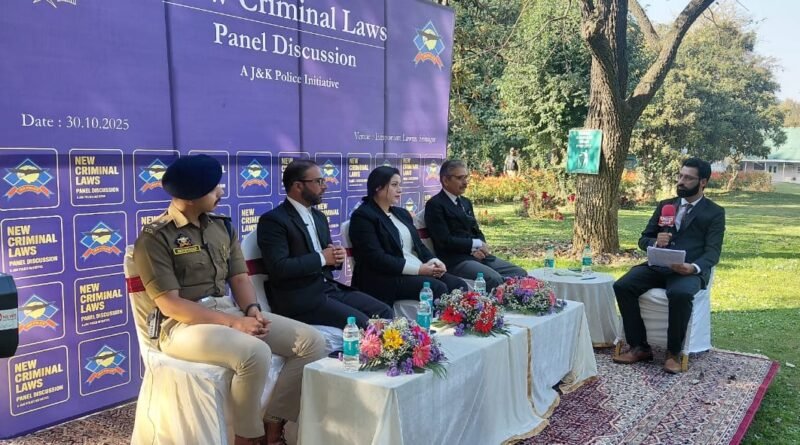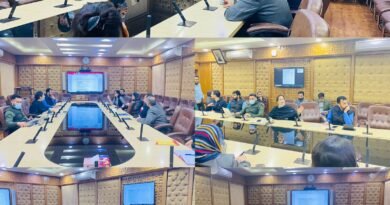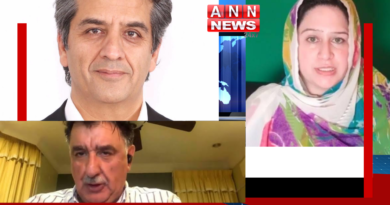JK Police Holds Panel Discussion on New Criminal Laws: Experts Simplify Reforms for Common Citizens
Program Will Run Sunday 8 PM On ANN News
Srinagar, Oct 30:
With an aim to bring legal awareness closer to the common man, the Jammu and Kashmir Police on Thursday organised a panel discussion on the New Criminal Laws — Bhartiya Nyaya Sanhita (BNS), Bhartiya Nagrik Suraksha Sanhita (BNSS) and Bhartiya Sakshya Adhiniyam (BSA) — at Emporium Park in Srinagar. The session witnessed a dynamic exchange of ideas as legal and policing experts dissected the newly implemented laws and their implications on justice delivery in India.
The event was moderated by Tariq Bhat, Editor-in-Chief, ANN News, who steered the conversation with balanced insight and depth, ensuring that complex legal provisions were explained in an engaging and relatable manner.
The discussion featured four panelists — Shri Hariprasad (ASP-IPS), Advocate K.K. Wangnoo, Advocate Heena Sultan, and Advocate Mudasir Yaqoob who engaged the audience with relevant public queries on how the new laws would reshape citizen–state interaction in matters of justice.
Opening the discussion, Advocate K.K. Wangnoo laid out the historical context behind the replacement of the colonial-era Indian Penal Code (IPC) with the Bhartiya Nyaya Sanhita, describing it as “a long-overdue Indianisation of criminal law.” He remarked that the new code marks a shift “from punishment to justice,” transforming citizens from colonial subjects to participants in justice.
Advocate Mudasir Yaqoob focused on the inclusion of new offences and modern crimes under the Bhartiya Nyaya Sanhita. He said the law brings cybercrime, mob lynching, organized crime, and terrorism within a comprehensive legal framework. “This reform brings law at par with today’s realities — time-bound investigations, digital filing, and transparency are the hallmarks of the new system,” he explained. Yaqoob also spoke in detail about the introduction of witness protection as a statutory right under Section 398 of the BNSS, calling it a “turning point for ensuring fearless testimony in courts.”
Representing the police perspective, IPS officer Hariprasad countered the perception that the new laws are “police-friendly.” He asserted that they are, in fact, “people-friendly and technology-driven,” ensuring transparency at every level of investigation. “Videography of searches, arrests, and seizures through the E-Sakshya app will ensure real-time accountability,” he said. The officer also highlighted the Jammu and Kashmir Police’s structured roadmap for implementation — including digitisation, training modules, and coordination with the Directorate of Prosecution and Forensic Science Laboratory to strengthen evidence-based investigation.
Advocate Heena Sultan spoke extensively on the victim-centric nature of the reforms. She said that the new laws, for the first time, recognise the victim’s right to information, participation, and compensation within the criminal process. “Victims can now receive case updates digitally and be heard at the bail stage. Justice has become participatory and people-oriented,” she said. She also underscored the legal reinforcement for protection of women, children, and vulnerable groups, describing the reforms as “a landmark step toward empathetic justice.”
The one-hour discussion was followed by an interactive question–answer session, where participants raised pertinent queries on issues such as E-FIRs, Zero FIR, and the newly introduced provision of community service as an alternative punishment for minor offences.
The event was widely appreciated for presenting the essence of the new criminal laws in simple and relatable terms. The discussion will run on ANN News on Sunday at 8 PM, aimed at spreading nationwide awareness about the new legal framework.
Panelists agreed that the reforms mark a decisive departure from colonial legal philosophy toward a justice system that is modern, transparent, and citizen-centric.




